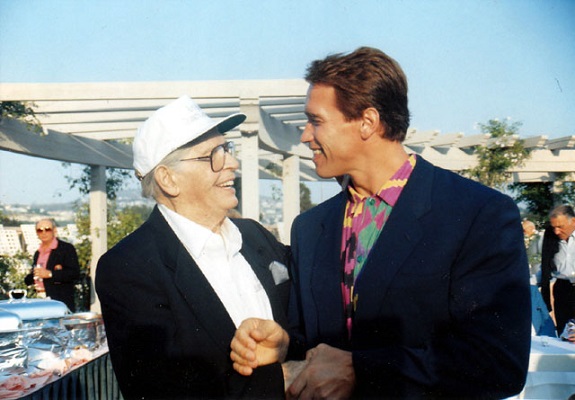In our lifetime, we encounter a variety of relationships, both of personal and professional natures. We have relationships with our families, our friends, our colleagues, our business partners, and our spouses. We often look at these relationships as different, unrelated avenues of life. For instance, our “work” life is to be separate from our “home” life; the relationship we share with a child is different from the one we share with a parent, and so on. While this is true, if we break it down many of our professional and personal relationships rely on the same components to result in happy partnerships. In our profession in the entertainment business we have daily interactions with bosses, clients, colleagues, contracted employees, interns, and consumers. Yet, no such relationship seems to bring forth as many questions and obstacles as that of working in a partnership with a celebrity.
Partnering with a celebrity endorser, whether for brands or non-profit organizations, takes a lot of steps in trust building, gaining mutual respect, and seeing eye-to-eye on details of the business deal. In many ways, working with celebrities is similar to working with a spouse; there are daily struggles and daily rewards that take a lot of hard work and communication to get through. Partnering with a celebrity can be much like a marriage; focusing on working with celebrities who endorse products or organizations, we’ll break down the fundamentals that lead to successful marriages. In following this marriage blueprint, you will be able to establish ongoing, mutually beneficial working relationships with celebrity clients.
Getting a celebrity to sign on and endorse your brand can make your product and business a household name. This can either be a great thing, or a negative thing depending on how well you choose the celebrity to link to your brand. In 2009, the “Got Milk” campaign dropped Chris Brown after his domestic abuse case with Rihanna became public. The popular “milk mustache” advertisements have a reputation of high-profile celebrity endorsers who maintain a positive image and exhibit strength, success, and likability. With Brown’s likability factor depleted, the “Got Milk” campaign pulled his endorsements. Similar things have happened with other celebrities; athletes O.J. Simpson, Kobe Bryant, Lance Armstrong, Michael Vick, Michael Phelps, and Oscar Pistorious all had endorsement campaigns pulled once scandals involving drug use, domestic abuse, sexual assault, or even murder hit the public news airwaves. Brands do not want to be associated with actions that are deplorable in the public eye. In contrast, celebrity endorsements can do positive wonders for brands. While Nike has always been a well-known brand in active footwear, the Air Jordan’s introduced in the 1980’s created the “Jordan” spinoff brand, making it a pop-culture and athletic staple; kids across the world wanted to be “like Mike,” and parents everywhere bought into the Nike brand as the leader in footwear. While these are examples of the extremely positive and negative extremes in endorsements, most celebrity endorsements, like marriages, fall somewhere in the middle of absolute success and extreme disaster.
Things To Consider When Choosing A Celebrity To Partner With

Choosing a celebrity to endorse your brand is like choosing the right marriage partner to share your life with. You and the celebrity must share in the same core beliefs in order to make the relationship work. When seeking a marriage partner, we think about morals and values. This can be a number of different things for different people. Whether it’s religious beliefs, political standpoint, general goodness, or similar work ethics, finding a spouse that is right for you should fall in line with your general attitude toward life and it’s priorities. The same goes for celebrity partnerships. The celebrity choices you make should fall in line with the values exhibited in your brand. For instance, you wouldn’t have the same celebrity endorse a fast food chain as well as a weight loss program, would you? These are two contrasting industries, and any celebrity who would endorse both likely does not wholeheartedly believe in your service or product. If your brand is athletic wear, you’ll want a celebrity endorser who lives their life with values related to health and fitness; not for instance, an overweight comedian or an actress publically known for her late night drinking binges. Just like in a marriage, if your favorite hobbies are hiking, water sports, and running 5k’s, your ideal spouse probably shouldn’t be a couch potato.
In addition to a similar moral and values standpoint, in both business partnerships and in marriages both partners should want the same desired outcome of the situation. Prior to marrying, people should talk about their future goals: do you both want children? Do you want to travel? Do you hope to one day move to a different location?; in business partnerships with celebrity endorsers, you should also discuss what you hope the end result might be: do you plan to endorse other products during the life of our contract? In what ways will you demonstrate belief in our brand in your everyday life? Do you intend to grow with our brand as we continue to build it and market it to the public? You’ll want to see that the celebrity hopes to make a substantial profit off the partnership and that they truly believe in the brand; if this is the case, it will motivate them as much as it motivates you to gain profit and recognition for the brand, just as in a marriage both partners need to be “all in” for it to result in success. Along with mutual priorities and desired outcome, one of the key components to a long-term marriage and a long-term business partnership is mutual respect. You must genuinely like one another and appreciate the other persons’ efforts, as well as all they do for the partnership, in order to gain this respect. Respect, like trust, does not happen over night, it takes time to be built up and it takes actions and characteristics on behalf of both partners to establish.
In order to make a marriage successful, a couple must be willing to openly communicate and provide full disclosure of their desires and goals in life in order to gain trust and respect. Also, each individual must work hard to make the partnership work, understanding that at times there will be challenges, but by working through issues in mutually respectful ways you can overcome and get back on track. However, in marriages, if we feel like our partner has betrayed or misled us, it is okay to accept defeat, cut ties, and move on. The same goes for celebrity partnerships. Just because you have committed to one another does not mean you should allow a celebrity to take advantage of your hard work and your brand. Like we mentioned earlier, if a celebrity’s image or values seem to waver and no longer fall in line with that of your brand, it is okay to say goodbye and build a new partnership elsewhere.
Celebrity Partnerships with Non-Profits

Celebrity partnerships with not-for-profit organizations bring several new layers into the endorsement mix. Celebrities linked to non-profits must truly believe in the cause since they are volunteering their time and efforts. As its name states, non-profit organizations do not see monetary profits that benefit their own business; rather they raise money and awareness to support efforts toward some kind of social change or provide services that benefit the public in some way. Having a familiar face of a celebrity will bring awareness to causes that may otherwise be swept under the rug. In 2009, the NOH8 (“no hate”) campaign was created to support gender and marriage equality in the United States. The image of dozens of celebrity endorsers who had the title “NOH8” painted on their faces and who wore duct tape over their mouths quickly circulated the Internet. The faces of Josh Hutcherson and the Kardashians garnered teen and young adult attention, while well-known gay activists like Cher, Alan Cumming, and Ricky Martin helped to continue the message by adding to the awareness for a population of people who have felt silenced for too long. Another highly successful celebrity partnership is between singer Sarah McLaughlan and the ASPCA. Millions of people associate her song “Angel” to the heartbreaking images of abused cats and dogs who need help and donations due to the commercial that has broadcast for years. With the attention grabbing of a popular song and popular artist, the ASPCA has received awareness, attention, volunteers, and monetary donations that they may not have otherwise received without such a meaningful celebrity partnership.
Just like with for-profit partnerships, non-profit celebrity endorsements come with their sets of challenges and rewards that can be related to those found in a marriage. Choosing the right celebrity endorser is like choosing the right life partner, because it can lead you down a path that is either good for you or detrimental to you depending on the partner’s actions. Just like marrying someone whose opinions on issues that are important to you are similar to your own, you must partner with celebrities whose personal belief systems and values fall in line with your organization’s. PETA, for example, has been met with a lot of scrutiny when some celebrity endorsers of their “rather go naked than wear fur” campaign, were indeed found wearing fur. This brings bad press to the organization, which now in the public eye does not have endorsers who live by their cause. In any partnership you must be sure that both individuals are on the same page in terms of how you present yourselves to the public.
In order to achieve a successful marriage, both partners must be invested in the relationship. Be sure to find celebrity partnerships that are truly invested in your cause. The way to do this is to look at their background, the types of charities they support, the type of work they do, and how much of an activist voice they have outside of their actual work. You must communicate clearly and see to what extent the celebrity plans to bring awareness. For instance, do they plan to promote the cause through social media exclusively, or are they willing to travel, do press, make speeches, and truly fight for the betterment of the issue they are promoting. Seeing to what extent someone is willing to work for a cause will allow you to see if they have the same level of investment as you do.
Some core qualities of a marriage is the ability to work in the best interest of yourselves as a unit rather than individual benefits, to remain hopeful and optimistic that you will continue down a positive path, to be committed to the vows you made for one another. When working with a celebrity on not-for-profit endorsements, these same qualities are relevant. Celebrities supporting a cause should not be doing so narcissistically to gain good press for themselves; they should truly believe in working together to gain attention to a cause and putting themselves in someone else’s shoes for the betterment of the relationship. Hope should always be present in achieving change when it comes to the cause, whether it be to aid starving children in Africa, bring awareness to domestic violence, or prevent suicide in teens, both the celebrity and the organization must believe that their actions are making a difference in someone’s life. They should remain empathetic toward the people their efforts affect, remain sincere in their efforts, and remain committed to the cause even when it seems their efforts are not making an immediate impact. Commitment and diligence are key to celebrity non-profit business partnerships and marriage alike.
Final Thoughts

Whether it is for your for-profit brands or non-profit organizations, having celebrities endorse your products, services, or causes can bring either positive or negative attention. Just like in a marriage partnership, both parties make a set of promises, or vows, that they intend to commit to throughout the life of the relationship. As in celebrity partnerships, similar promises and expectations should be made and well-communicated prior to making a long-term commitment. You must ensure that like a spouse, celebrity partners share the same viewpoint on life, share in the same core values, and have the same dedication to the cause or brand that your organization believes will garner positive attention. In the long-run, a celebrity partnership should be one that continues to grow, adapt, and, in the event things are not going as planned, be terminated if necessary. Celebrity partnerships are like marriages in that both parties must work to make one another happy in order to achieve long-term, mutually beneficial success.
Do you agree with this? Let me know your opinions on this article in the comments.



